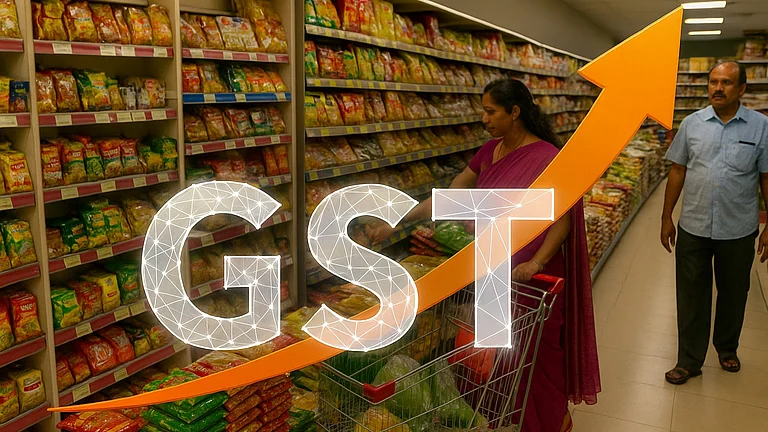
GST rationalisation boosts FMCG demand outlook.
Food and personal care products see major tax cuts.
Britannia, Colgate, Nestlé among top beneficiaries.
Shares of consumer-oriented companies, spanning staples and discretionary categories, were in sharp focus on September 3 after the GST Council, led by Finance Minister Nirmala Sitharaman, unveiled sweeping tax cuts across a wide range of products.
Among FMCG counters, Britannia, Colgate, Emami and Dabur led the charge with gains of 3–6%, while HUL, ITC, Nestlé, Marico and Patanjali Foods rose 1–2%. The broad rally across consumer stocks pushed the Nifty FMCG index around 2% higher. Meanwhile, consumer staples had already been on a steady uptrend since Prime Minister Narendra Modi, in his Independence Day address on August 15, first hinted at significant GST changes.
The council approved a major rationalisation of the GST structure, doing away with the existing four-rate system into two slabs, 18% and 5%, alongside a 40% de-merit rate on select goods and services. As part of this revamp, taxes on almost all food categories including biscuits, instant noodles, nutritional products, namkeen, instant coffee, chocolates, ice cream, fruit juices, sauces and cheese, were reduced to 5% from the previous 12% or 18%. Similarly, personal care essentials such as soaps, shampoos, hair oils and toothpaste also saw their GST rates cut to 5% from 18%.
For the broader consumption basket, the wide-ranging rate reductions across food and key personal care products could provide a meaningful demand boost, according to Amit Agarwal, Senior Vice President – Fundamental Research at Kotak Securities. “Easing commodity prices (tea, palm, coffee), a favourable monsoon, a supportive base for urban consumption, the recent personal income tax cuts and the upcoming pay commission all bode well for FMCG consumption over the next 12–15 months. Moreover, the GST rate cuts could allow some headroom for price increases in the medium term,” he noted.
Devarsh Vakil, Head of Prime Research at HDFC Securities, echoed a similar sentiment. “This sweeping overhaul is designed to make everything from daily essentials and food items to appliances and small cars more affordable, while discouraging unhealthy consumption,” Vakil said.
However, brokerages see differentiated benefits for individual players basis their portfolios. Dabur India is expected to gain in beverages and Chyawanprash (accounting for about 23% of India revenues), ITC from its ‘other FMCG’ segment (roughly 11% of revenues), and Britannia in its dairy and wafer portfolio (less than 5% of revenues). Marico and HUL should also benefit, though to a relatively smaller degree, according to Emkay Global.
CLSA estimated the move to reduce consumer prices by 6–11% and deliver a significant lift to FMCG demand, with food and home & personal care products benefiting the most. Britannia and Colgate stand out as the top beneficiaries, given their near-complete portfolio coverage.
International brokerage Morgan Stanley expects staples to be clear beneficiaries, driving growth and accelerating the shift towards organised players. Within the segment, food companies such as Britannia, Nestlé and Tata Consumer are better positioned than HPC peers, it added.

































